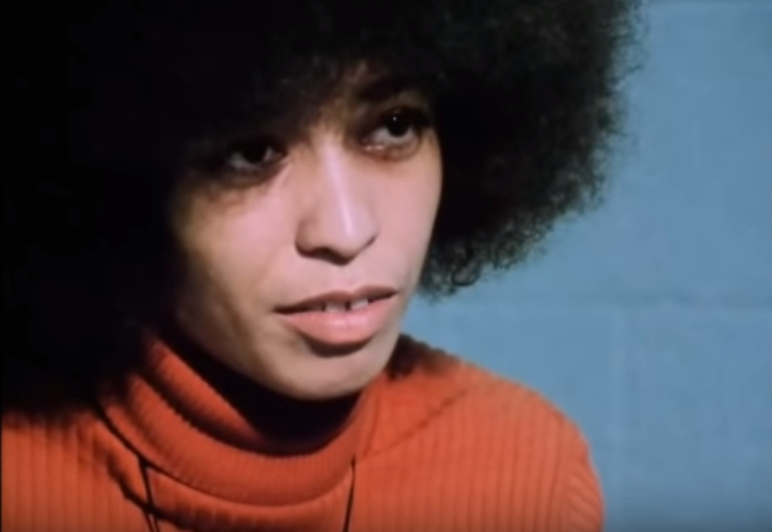Feminist Theorist Thursdays: Angela Davis

Image courtesy of Black Power via Youtube
In Göran Olsson’s “The Black Power Mixtape” (2011), Angela Davis, a prominent former member of the Communist Party of the USA (CPUSA) and close affiliate of the Black Panther Party for Self-Defense, looked back on the years of her criminal trial in the early 1970s. She saw her trial as an attempt by the federal and state governments and their respective militarized apparatuses (the FBI and police) to send a “convenient figure [to the] death chambers… to make a point that they would suppress any efforts at revolution and liberation.” The grounds for the trial, for which she was later acquitted, were conspiracy, kidnapping, and murder based on the fact that the firearms she purchased were used in the Marin County courthouse armed takeover in 1970. Her claims to innocence and her defense of arming oppressed people inspired the Civil Rights Movement’s call to free all political prisoners. She has since become the figurehead for the prison abolition movement, a movement that calls into question what it means to be a criminal within a white-supremacist capitalist society.
Davis is well known for speaking and writing about anti-racism, feminism, and socialism. She attributes her induction into politics to her involvement in Girl Scouts of America as a teen, wherein she protested racial segregation in Birmingham, Alabama. In her book Women, Race, and Class, Davis heavily critiques white abolitionism for “either defend[ing] the industrial capitalists or express[ing] no conscious class loyalty at all,” as well as the Women’s Rights Movement for excluding the voices of Black, trans, and working class women. She saw the goal of women’s suffrage as principally a bourgeois white women’s goal rather than any goal of the militant working-class women who were more interested in revolution than in trying to vote out their oppressor within bourgeois electoral systems.
Her cognizant critique of the prison-industrial complex in the widely shared and accessible pamphlet Are Prisons Obsolete? reveals the function of prisons to be a tool to “relieve us of the responsibility of seriously engaging with the problems of our society, especially those produced by racism and, increasingly, global capitalism.” That is to say, prisons lock up those struggling against capitalism rather than confronting and fixing these contradictions. It is important to note that Davis also refuses to support reactionary political prisoners living under socialist governments who seek to reinstill class society. Her critique of prisons is centered in the problems which are inherent to a capitalist society.
At age 25, Davis became an icon of political militancy, her notable intellect earned her a position teaching philosophy at UCLA. However, Davis was dismissed from the university twice: the first time by Governor Ronald Reagan in 1969 for her Communist Party membership, and the second by the UC Board of Regents in 1970 for her unfiltered language concerning the Regents’ violence against and murder of demonstrators at Berkeley’s People’s Park, as well as her repeated reference to the police as ‘pigs.’ Although students and faculty fought for the reinstatement of the popular assistant professor, it would be 45 years until she would give another lecture at UCLA. In the face of all levels of power among and within the state institutions aligned against her, Davis continued to speak freely and truthfully.
During the rise of the socialist bloc in the 1970s, Davis travelled by invitation to Cuba and the Soviet Union, where she convened with the Federation of Cuban Women, met with Afro-Cubans, and received the Lenin Peace Prize and an honorary doctorate from Moscow. After Davis visited Assata Shakur, the highest-ranked woman on the FBI’s Most Wanted List who took political refuge in Cuba, Davis declared that “only under socialism could the fight against racism be successfully executed.” As a radical who was also appointed a slot on the FBI’s 10 Most Wanted list, Davis continues to campaign for Assata’s freedom and asylum.
Today, Angela Davis still writes heavily, gives guest lectures at prestigious universities, and continues her work in prison abolition as a cofounder of Critical Resistance, a grassroots organization that aims to direct a mass movement to completely dismantle the prison system. Radical activists of the 1970s who were jailed for political activity remain in prison as part of the millions incarcerated by the State’s war against Black Americans, immigrants, poor people, and political dissidents. With 2.23 million people incarcerated in the U.S. today, the relevance of prison abolition has not wavered.
Angela Davis’s legacy is embedded in a global movement against all forms of oppression and continues to inspire activists, Black radicals, socialists, and feminists alike. She states, “the importance of doing activist work is precisely because it allows you to give back and to consider yourself not as a single individual who may have achieved whatever but to be a part of an ongoing historical movement.”




